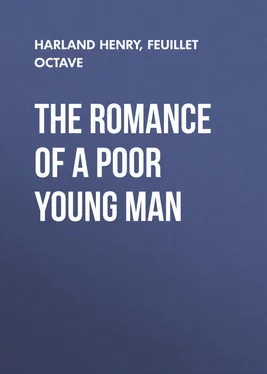Henry Harland - The Romance of a Poor Young Man
Здесь есть возможность читать онлайн «Henry Harland - The Romance of a Poor Young Man» — ознакомительный отрывок электронной книги совершенно бесплатно, а после прочтения отрывка купить полную версию. В некоторых случаях можно слушать аудио, скачать через торрент в формате fb2 и присутствует краткое содержание. Жанр: foreign_antique, foreign_prose, на английском языке. Описание произведения, (предисловие) а так же отзывы посетителей доступны на портале библиотеки ЛибКат.
- Название:The Romance of a Poor Young Man
- Автор:
- Жанр:
- Год:неизвестен
- ISBN:нет данных
- Рейтинг книги:5 / 5. Голосов: 1
-
Избранное:Добавить в избранное
- Отзывы:
-
Ваша оценка:
- 100
- 1
- 2
- 3
- 4
- 5
The Romance of a Poor Young Man: краткое содержание, описание и аннотация
Предлагаем к чтению аннотацию, описание, краткое содержание или предисловие (зависит от того, что написал сам автор книги «The Romance of a Poor Young Man»). Если вы не нашли необходимую информацию о книге — напишите в комментариях, мы постараемся отыскать её.
The Romance of a Poor Young Man — читать онлайн ознакомительный отрывок
Ниже представлен текст книги, разбитый по страницам. Система сохранения места последней прочитанной страницы, позволяет с удобством читать онлайн бесплатно книгу «The Romance of a Poor Young Man», без необходимости каждый раз заново искать на чём Вы остановились. Поставьте закладку, и сможете в любой момент перейти на страницу, на которой закончили чтение.
Интервал:
Закладка:
She might have added "un homme très-digne." For if we have a fault to find with Maxime, it is that he seems just possibly a thought too "digne." But that is a fault common to so many men in fiction. French novelists, like English lady novelists, are terribly apt to make their men too "digne" – when they don't make them too unspeakably indigne . Maxime, however, we mustn't forget, is his own portraitist, and we'll hope in this detail the portrait errs. For the rest, we are content to accept it as he paints it. He is a poor young man, but he is also a fairy prince. Therefore he can vaunt himself as an ordinary poor young man could hardly do with taste. He can perform and narrate his prodigies of skill and valour without offending. He can rescue an enormous Newfoundland dog from a raging torrent, for example, with the greatest ease in the world, an exploit you or I might have found ticklish, and he can tell us of it afterward, a proceeding you or I might have shrunk from as vainglorious. For Maxime is a fairy prince; the dog belongs to the fairy princess; and the bad prince, the rival, who is standing by, doesn't know how to swim. Again, with splendid indifference, he can accomplish and record his leap from the Tour d' Elven to save the fairy princess from a situation that might, in Fairyland, have compromised her; hadn't the princess unjustly impugned his honour, and insinuated that the situation was one he had deliberately brought to pass? "Monsieur le Marquis de Champcey, y a t-il eu beaucoup de lâches dans votre famille avant vous?" superbly demands Marguerite; and we can see her kindling eye, the scornful curl of her lip, we can hear the disdainful tremor of her voice. Maxime would be a poor-spirited poor young man, indeed, if, after that, he should hesitate to jump. And he has his immediate compensation. "Maxime! Maxime!" cries the haughty princess, now all remorse, "par grâce, par pitié! au nom du bon Dieu, parlez-moi! pardonnez-moi!" So that, though the prince goes away with a broken arm, the lover carries exultancy in his heart.
Is Maxime perhaps just a thought too "digne," also, in his relations with his little sister – when he visits her at school, for instance, and promises to convey the bread she cannot eat to some deserving beggar? At the moment he is the most deserving beggar he chances to know of, but he is resolved to keep his beggary a secret from Hélène. "Cher Maxime," says she, "a bientôt, n'est-ce pas? Tu me diras si tu as rencontré un pauvre, si tu lui as donné mon pain, et s'il l'a trouvé bon." And Maxime, in his journal: "Oui, Hélène, j'ai rencontré un pauvre, et je lui ai donné ton pain, qu'il a emporté comme une proie dans sa mansarde solitaire, et il l'a trouvé bon; mais c'était un pauvre sans courage, car il a pleuré en devorant l'aumône de tes petites mains bien-aimeés. Je te dirai tout celà, Hélène, car il est bon que tu saches qu'il y a sur la terre des souffrances plus sérieuses que tes souffrances d'enfant: je te dirai tout, excepté le nom du pauvre." It certainly is "digne," isn't it? Is it a trifle too much so? Isn't it a trifle priggish, a trifle preachy? Is it within the limits of pure pathos? Or does it just cross the line? I don't know.
I am rather inclined to think that Maxime is at his best – at once most human and most fairy princelike – in his relations with the pre-eminently human fairy Porhoët. He is entirely human, and weak, and nice, when he blurts out to her the secret of his high birth. Hadn't she just been boasting of her own, and invidiously citing Monsieur l'intendant as a typical plebeian? "En ce qui me concerne, mademoiselle," he has the human weakness to retort, "vous vous trompez, car ma famille a eu l'honneur d'être alliée à la vôtre, et réciproquement." He remains human and weak throughout the somewhat embarrassing explanations that are bound to follow; and if, in their subsequent proceedings, after she has adopted him as "mon cousin," he will still from time to time become a trifle priggish and a trifle preachy, we must remember that mortal man, in the hands of a French novelist, has to choose between that and a career of profligacy.
It is by his Roman d'un Jeune Homme Pauvre that Feuillet is most widely known outside of France; it is by this book that he will "live," if he is to live. Certainly it is his freshest, his sincerest, his most consistently agreeable book.
HENRY HARLAND.
BIOGRAPHICAL NOTE
Octave Feuillet was born at Saint-Lô, in the department of the Manche, on the 11th of August, 1821. His father, who belonged to one of the oldest Norman families, was secretary-general to the prefect, and a little later, in the revolution of 1830, played a prominent part in politics. A hereditary nervousness, amounting finally to a disease, alone prevented him, according to Guizot, from being given a portfolio in the new ministry. Octave inherited his father's excessive sensibility, although in later years he held it more under control. After the death of his mother, which occurred as he was developing in boyhood, he became so melancholy that, at the advice of the physicians, he was sent to a school in Paris, where his health gradually became re-established; afterward, at the Collège de Louis-le-Grand, he greatly distinguished himself as a scholar. It was his father's design to prepare him for the diplomatic career, but already the desire to write had awakened itself in him. When the moment came for choosing a profession, Octave timidly confessed his determination to make literature his business in life; the irascible old gentleman at Saint-Lô turned him out of the house, and cut off his allowance. He returned to Paris, and for three years had a hard struggle with poverty. During this time, under the encouragement of the great actor Bocage, Octave Feuillet brought out three dramas, "Échec et Mat," "Palma," and "La Vieillesse de Richelieu," under the pseudonym of "Désiré Hazard." These were successful, and the playwright's father forgave and welcomed him back to his favour. Octave remained in Paris, actively engaged in literary work, mainly dramatic, but gradually in the line of prose fiction also. In 1846 he published his novel of "Polichinelle," followed in 1848 by "Onesta," in 1849 by "Redemption" and in 1850 by "Bellah." None of these are remembered among Octave Feuillet's best works, but he was gaining skill and care in composition. In 1850, however, he was suddenly summoned home to Saint-Lô by the increased melancholy of his father, who could no longer safely be left alone in the gloomy ancestral mansion which he refused to leave. Octave, with resignation, determined to sacrifice his life to the care of his father, and in this piety he was supported by his charming cousin, Valérie Feuillet, a very accomplished and devoted woman, whom he married in 1851. For eight years they shared this painful exile, the father of Octave scarcely permitting them to leave his sight, and refusing every other species of society. Strangely enough, this imprisonment was not unfavourable to the novelist's genius; the books he wrote during this period – "Dalila," "La Petite Comtesse" (1856), "Le Village," and finally "Le Roman d'un Jeune Homme Pauvre" (1858) – being not only far superior to what he had previously published, but among the very finest of all his works. By a grim coincidence, on almost the only occasion on which Octave Feuillet ventured to absent himself for a day or two, to be present at the performance of his "Roman d'un Jeune Homme Pauvre," when it was dramatized in 1858, the father suddenly died while the son was in Paris. This was a great shock to Feuillet, who bitterly and unjustly condemned himself. He was now, however, free, and, with his wife and children, he returned to Paris. He was now very successful, and soon became a figure at Compiègne and in the great world. In 1862 he published "Sibylle," and was elected a member of the French Academy. A great favourite of the Emperor and Empress, he was tempted to combine the social life at Court with the labours of literature. His health began to suffer from the strain, and, to recover, he retired again to Saint-Lô, where he lived, not in the home of his ancestors, but in a little house above the ramparts, called Les Paillers; for the future he spent only the winter months in Paris. His novels became fewer, but not less carefully prepared; he enjoyed a veritable triumph with "Monsieur de Camors" in 1867. Next year he was appointed Royal Librarian at Fontainbleu, an office which he held till the fall of the Empire. He then retired to Les Paillers again, where he had written "Julia de Trécoeur" in 1867. The end of his life was troubled by domestic bereavement and loss of health; he hurried restlessly from place to place, a prey to constant nervous agitation. His later writings were numerous, but had not the vitality of those previously mentioned. Octave Feuillet died in Paris, December 28, 1890, and was succeeded at the French Academy by Pierre Loti. Octave was the type of a sensitive, somewhat melancholy fine gentleman; he was very elegant in manners, reserved and ceremonious in society, where he held himself somewhat remote in the radiance of his delicate wit; but within the bosom of his family he was tenderly and almost pathetically demonstrative. The least criticism was torture to him, and it is said that when his comedy of "La Belle au Bois Dormant" was hissed off the boards of the Vaudeville in 1865, for three weeks afterward the life of Feuillet was in danger. Fortunately, however, for a "fiery particle" so sensitive, the greater part of his career was one continuous triumph.
Читать дальшеИнтервал:
Закладка:
Похожие книги на «The Romance of a Poor Young Man»
Представляем Вашему вниманию похожие книги на «The Romance of a Poor Young Man» списком для выбора. Мы отобрали схожую по названию и смыслу литературу в надежде предоставить читателям больше вариантов отыскать новые, интересные, ещё непрочитанные произведения.
Обсуждение, отзывы о книге «The Romance of a Poor Young Man» и просто собственные мнения читателей. Оставьте ваши комментарии, напишите, что Вы думаете о произведении, его смысле или главных героях. Укажите что конкретно понравилось, а что нет, и почему Вы так считаете.












